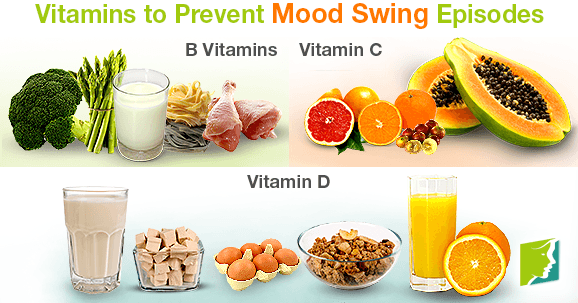Mood swings are common not only among menopausal women, but also in females of all ages, from puberty to postmenopause. One difference is that during menopause, your body becomes more sensitive to nutritional deficiencies. The hormonal changes taking place makes it more important than ever to keep an eye on your nutritional health. With decreased estrogen can come irritability and mood swings, but it can be managed, and vitamins B through D can help with the endeavor.
B Vitamins
Lack of vitamins B1, B2, and B6 can result in confusion, irritability, and lack of motivation. B6 in particular plays a role in regulating levels of serotonin and norepinephrine, neurotransmitters that are essential for happiness. It also regulates melatonin, so a shortage can result in sleeplessness. Studies have also shown that people with depression are likely to have inadequate levels of B12 and B9 (folate).
Get your Bs from asparagus, broccoli, dates, poultry, nuts, wheat germ, and a little bit of dairy. If you are vegetarian or vegan, you may have to take a B12 supplement, as it's mostly found in meat and other animal products.
Vitamin C
Research has shown that individuals with emotional disorders like anxiety and depression have lower levels of vitamin C and other antioxidant vitamins than those without these disorders. With enough vitamin C, you can feel more healthy and optimistic. It is a potent antioxidant, which helps increase immune system activity and reduce signs of aging. Other antioxidant vitamins are A and E.
Vitamin C can be found in papaya, grapefruit, kiwi, citrus fruits, red bell pepper, and dark leafy greens. If you want to try something new and interesting, camu camu has the densest vitamin C content of any known plant, and it is delicious in a smoothie.
Vitamin D
Vitamin D is important for far more than just strong bones. Anxiety, exhaustion, and a quick temper is a common theme among people deficient in D vitamins. People often feel like they are constantly tired, which can be very stressful and weigh down on one's already overwhelming schedule or routine.
This can be more of an issue in the winter months, when sunlight is scarce, so soak it in while you can; the body produces vitamin D when it is exposed to sunlight. Vitamin D is also found in abundance in swordfish, margarine, egg yolks, Swiss cheese, and fortified products such as orange juice, soymilk, and cereals.
Dietary choices are a big deal when it comes to getting through mood swing episodes. If your diet is lacking in these essential vitamins, it may be contributing to the severity and frequency of mood swings. Explore these with other managing options for mood swings and try to incorporate each of these vitamins into each of your meals throughout the day.
Sources
- Coppen, A. & Bolander-Gouaille, C. (2005). Treatment of depression: time to consider folic acid and vitamin B12. Journal of psychopharmacology, 19(1), 59-65. Retrieved from http://www.ncbi.nlm.nih.gov/pubmed/15671130
- Gautam, M. et al. (2012). Role of antioxidants in generalised anxiety disorder and depression. Indian Journal of Psychiatry, 54(3), 244-247. doi: 10.4103/0019-5545.102424
- Hartvig, P. et al. (1995). Pyridoxine effect on synthesis rate of serotonin in the monkey brain measured with positron emission tomography. Journal of neural transmission, 102(2), 91-97. Retrieved from http://www.ncbi.nlm.nih.gov/pubmed/8748674
- Harvard School of Public Health. (n.d.). Vitamin C. Retrieved June 6, 2014, from http://www.hsph.harvard.edu/nutritionsource/vitamin-c/
- Murphy, P.K. & Wagner, C.L. (2008). Vitamin D and mood disorders among women: an integrative review. Journal of midwifery & women's health, 53(5), 440-446. doi: 10.1016/j.jmwh.2008.04.014
- National Institutes of Health. (2013). Vitamin B1. Retrieved June 6, 2014, from http://www.nlm.nih.gov/medlineplus/druginfo/natural/965.html
- NYU Langone Medical Center. (2013). Vitamin D. Retrieved June 6, 2014, from http://www.med.nyu.edu/content?ChunkIID=14044
- University of Maryland Medical Center. (2013). Vitamin B6. Retrieved June 6, 2014, from http://umm.edu/health/medical/altmed/supplement/vitamin-b6-pyridoxine
- University of Maryland Medical Center. (2013). Vitamin B12. Retrieved June 6, 2014, from http://umm.edu/health/medical/altmed/supplement/vitamin-b12-cobalamin
- University of Maryland Medical Center. (2013). Vitamin B2. Retrieved June 6, 2014, from http://umm.edu/health/medical/altmed/supplement/vitamin-b2-riboflavin




